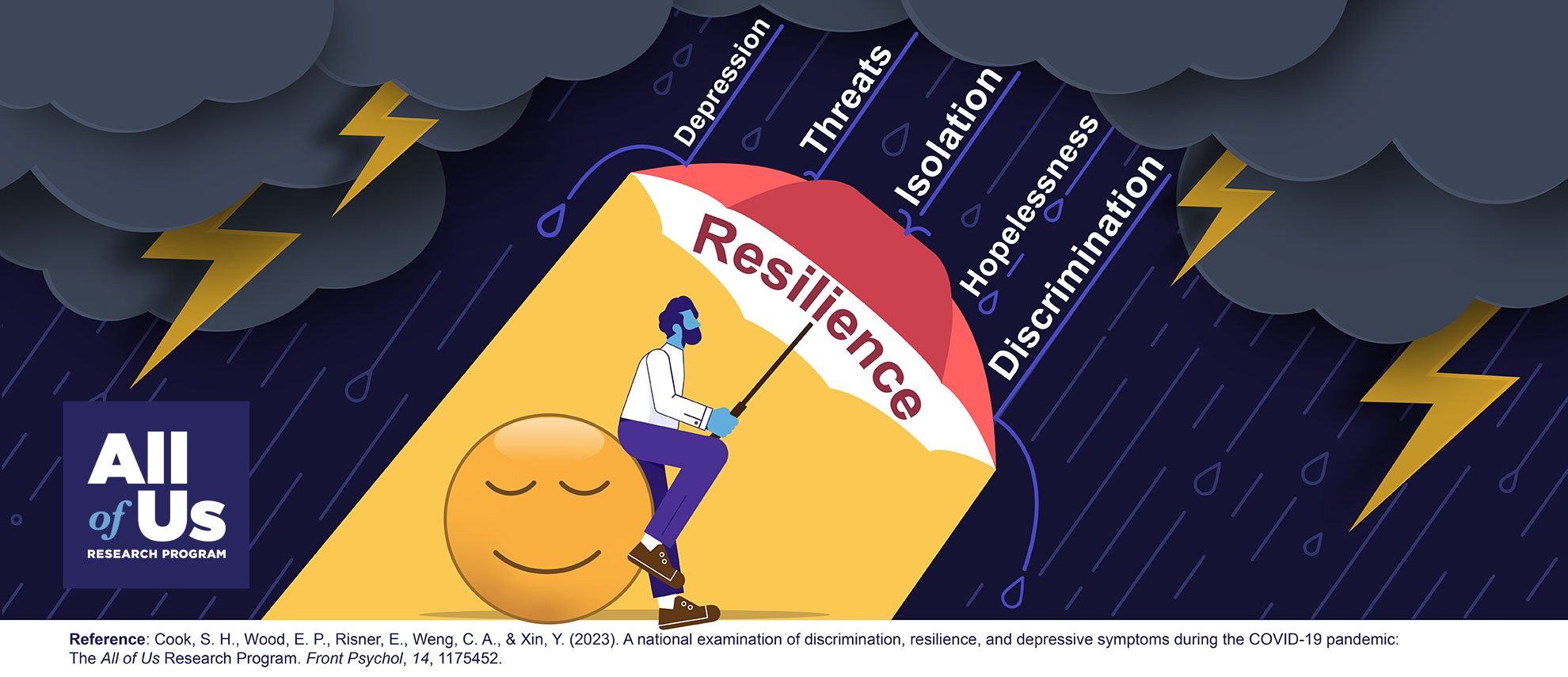
Key points
- Feelings of depression increased during COVID-19, especially among participants who experienced discrimination.
- Having more resilience lessened the effect of discrimination on mental health in participants from some races and ethnicities.
- More research on how different groups use resilience is needed.
The COVID-19 pandemic was a time of heightened stress. How did people deal with that when the social networks many rely on for support were less available?
Many social and environmental factors, including discrimination, contribute to stress. Over time, stress and discrimination negatively affect mental health and can lead to depression. Although we cannot overlook the importance of addressing the societal factors that affect some racial and ethnic groups more than others, this research focuses on better understanding how a characteristic such as resilience can positively influence mental health outcomes.
Researchers looked at All of Us survey data to learn how the pandemic affected participants’ mental health. The researchers were particularly interested in whether resilience helped participants cope.
As expected, the survey data showed that feelings of depression increased over the course of the pandemic. Yet, participants with a high level of resilience did not feel as depressed over time as participants with a low level of resilience. This was true even if they experienced discrimination. But the effectiveness of resilience was different among racial and ethnic groups. These findings were published in Frontiers in Psychology.
What Is Resilience?
Resilience is our ability to cope with difficulties. We all have a baseline resilience that is like part of our personality. And we can build resilience by learning better ways to deal with challenges.
This study measured whether participants had low, average, or high baseline resilience based on how well they thought the four statements below described them:
- I look for creative ways to alter difficult situations.
- Regardless of what happens to me, I believe I can control my reaction to it.
- I believe that I can grow in positive ways by dealing with difficult situations.
- I actively look for ways to replace the losses I encounter in life.
If the study shows that baseline resilience was protective in a time of extreme difficulty, then building a person’s resilience may help protect their mental health when they face difficulty in the future.
Studying Complex Experiences
To understand what people went through during the pandemic, the researchers looked at survey responses shared by nearly 52,000 All of Us participants. The participants could take the COVID-19 surveys up to five times between May and December 2020. The surveys asked about:
- Their feelings of sadness and depression
- Their experiences with discrimination
- Their experiences during COVID-19
Researchers found that feelings of depression grew over the early part of the pandemic. These feelings worsened more in participants who experienced discrimination than in those who did not.
However, high baseline resilience lessened the effect of discrimination on participants’ mental health. In participants with high resilience, the worsening of depression was less than in those with low resilience. This was true even among participants who experienced discrimination.
Not all participants benefited the same from resilience. Resilience was most protective for participants who identified as Asian, Black/African American, or White.
The benefit of resilience was not clear for participants who identified as Hispanic/Latino, multiracial, or belonging to other racial or ethnic groups. This suggests that people in different racial and ethnic groups may rely on resilience differently when coping with stress.
Learning More About Resilience
This study shows that resilience is especially important in difficult times when typical resources are not available. But there is still more to learn about discrimination, resilience, and mental health. This study measured resilience in one way. There may be other forms of resilience that were not captured by the survey questions. Because of their cultural upbringing and environment, individuals from different racial and ethnic groups may rely on certain forms of resilience more than others.
More research is needed to learn how different groups build and use resilience. Then health professionals can develop relevant mental health supports to benefit people of all races and ethnicities.
Interested in All of Us?
- Read more research highlights.
- Learn about participation in the program.
- Complete All of Us Surveys (login or enrollment required).
Conduct research with All of Us
- Learn about opportunities for researchers.
- Find funding to support research using All of Us data.
- See more research projects made possible by All of Us data and tools.


